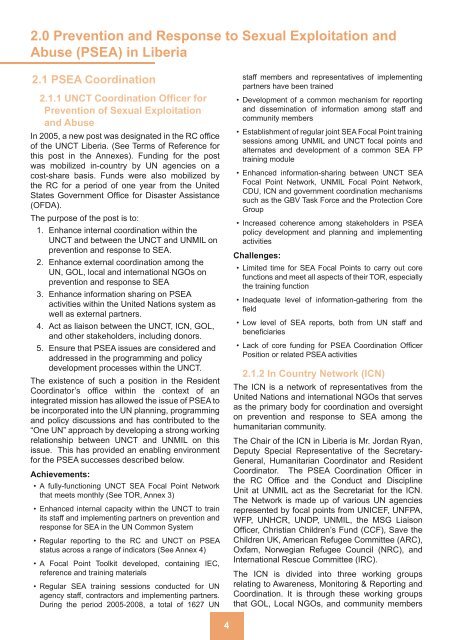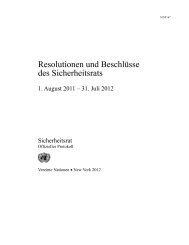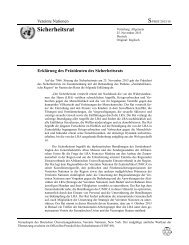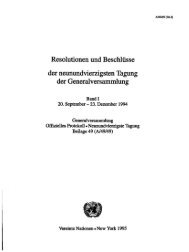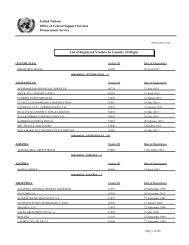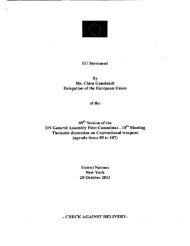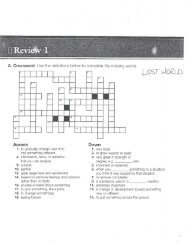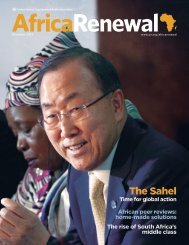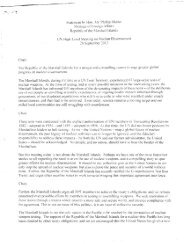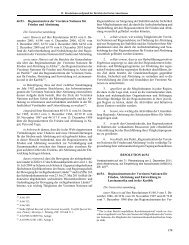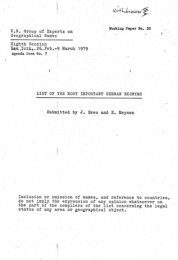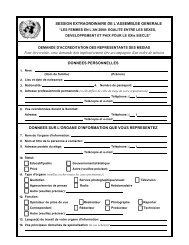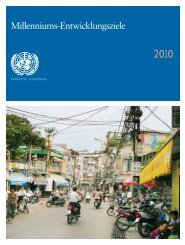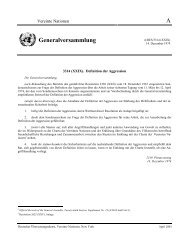Prevention and Response to Sexual Exploitation & Abuse in Liberia
Prevention and Response to Sexual Exploitation & Abuse in Liberia
Prevention and Response to Sexual Exploitation & Abuse in Liberia
Create successful ePaper yourself
Turn your PDF publications into a flip-book with our unique Google optimized e-Paper software.
2.0 <strong>Prevention</strong> <strong>and</strong> <strong>Response</strong> <strong>to</strong> <strong>Sexual</strong> <strong>Exploitation</strong> <strong>and</strong><br />
<strong>Abuse</strong> (PSEA) <strong>in</strong> <strong>Liberia</strong><br />
2.1 PSEA Coord<strong>in</strong>ation<br />
2.1.1 UNCT Coord<strong>in</strong>ation Officer for<br />
<strong>Prevention</strong> of <strong>Sexual</strong> <strong>Exploitation</strong><br />
<strong>and</strong> <strong>Abuse</strong><br />
In 2005, a new post was designated <strong>in</strong> the RC office<br />
of the UNCT <strong>Liberia</strong>. (See Terms of Reference for<br />
this post <strong>in</strong> the Annexes). Fund<strong>in</strong>g for the post<br />
was mobilized <strong>in</strong>-country by UN agencies on a<br />
cost-share basis. Funds were also mobilized by<br />
the RC for a period of one year from the United<br />
States Government Office for Disaster Assistance<br />
(OFDA).<br />
The purpose of the post is <strong>to</strong>:<br />
1. Enhance <strong>in</strong>ternal coord<strong>in</strong>ation with<strong>in</strong> the<br />
UNCT <strong>and</strong> between the UNCT <strong>and</strong> UNMIL on<br />
prevention <strong>and</strong> response <strong>to</strong> SEA.<br />
2. Enhance external coord<strong>in</strong>ation among the<br />
UN, GOL, local <strong>and</strong> <strong>in</strong>ternational NGOs on<br />
prevention <strong>and</strong> response <strong>to</strong> SEA<br />
3. Enhance <strong>in</strong>formation shar<strong>in</strong>g on PSEA<br />
activities with<strong>in</strong> the United Nations system as<br />
well as external partners.<br />
4. Act as liaison between the UNCT, ICN, GOL,<br />
<strong>and</strong> other stakeholders, <strong>in</strong>clud<strong>in</strong>g donors.<br />
5. Ensure that PSEA issues are considered <strong>and</strong><br />
addressed <strong>in</strong> the programm<strong>in</strong>g <strong>and</strong> policy<br />
development processes with<strong>in</strong> the UNCT.<br />
The existence of such a position <strong>in</strong> the Resident<br />
Coord<strong>in</strong>a<strong>to</strong>r’s office with<strong>in</strong> the context of an<br />
<strong>in</strong>tegrated mission has allowed the issue of PSEA <strong>to</strong><br />
be <strong>in</strong>corporated <strong>in</strong><strong>to</strong> the UN plann<strong>in</strong>g, programm<strong>in</strong>g<br />
<strong>and</strong> policy discussions <strong>and</strong> has contributed <strong>to</strong> the<br />
“One UN” approach by develop<strong>in</strong>g a strong work<strong>in</strong>g<br />
relationship between UNCT <strong>and</strong> UNMIL on this<br />
issue. This has provided an enabl<strong>in</strong>g environment<br />
for the PSEA successes described below.<br />
Achievements:<br />
• A fully-function<strong>in</strong>g UNCT SEA Focal Po<strong>in</strong>t Network<br />
that meets monthly (See TOR, Annex 3)<br />
• Enhanced <strong>in</strong>ternal capacity with<strong>in</strong> the UNCT <strong>to</strong> tra<strong>in</strong><br />
its staff <strong>and</strong> implement<strong>in</strong>g partners on prevention <strong>and</strong><br />
response for SEA <strong>in</strong> the UN Common System<br />
• Regular report<strong>in</strong>g <strong>to</strong> the RC <strong>and</strong> UNCT on PSEA<br />
status across a range of <strong>in</strong>dica<strong>to</strong>rs (See Annex 4)<br />
• A Focal Po<strong>in</strong>t Toolkit developed, conta<strong>in</strong><strong>in</strong>g IEC,<br />
reference <strong>and</strong> tra<strong>in</strong><strong>in</strong>g materials<br />
• Regular SEA tra<strong>in</strong><strong>in</strong>g sessions conducted for UN<br />
agency staff, contrac<strong>to</strong>rs <strong>and</strong> implement<strong>in</strong>g partners.<br />
Dur<strong>in</strong>g the period 2005-2008, a <strong>to</strong>tal of 1627 UN<br />
4<br />
staff members <strong>and</strong> representatives of implement<strong>in</strong>g<br />
partners have been tra<strong>in</strong>ed<br />
• Development of a common mechanism for report<strong>in</strong>g<br />
<strong>and</strong> dissem<strong>in</strong>ation of <strong>in</strong>formation among staff <strong>and</strong><br />
community members<br />
• Establishment of regular jo<strong>in</strong>t SEA Focal Po<strong>in</strong>t tra<strong>in</strong><strong>in</strong>g<br />
sessions among UNMIL <strong>and</strong> UNCT focal po<strong>in</strong>ts <strong>and</strong><br />
alternates <strong>and</strong> development of a common SEA FP<br />
tra<strong>in</strong><strong>in</strong>g module<br />
• Enhanced <strong>in</strong>formation-shar<strong>in</strong>g between UNCT SEA<br />
Focal Po<strong>in</strong>t Network, UNMIL Focal Po<strong>in</strong>t Network,<br />
CDU, ICN <strong>and</strong> government coord<strong>in</strong>ation mechanisms<br />
such as the GBV Task Force <strong>and</strong> the Protection Core<br />
Group<br />
• Increased coherence among stakeholders <strong>in</strong> PSEA<br />
policy development <strong>and</strong> plann<strong>in</strong>g <strong>and</strong> implement<strong>in</strong>g<br />
activities<br />
Challenges:<br />
• Limited time for SEA Focal Po<strong>in</strong>ts <strong>to</strong> carry out core<br />
functions <strong>and</strong> meet all aspects of their TOR, especially<br />
the tra<strong>in</strong><strong>in</strong>g function<br />
• Inadequate level of <strong>in</strong>formation-gather<strong>in</strong>g from the<br />
field<br />
• Low level of SEA reports, both from UN staff <strong>and</strong><br />
beneficiaries<br />
• Lack of core fund<strong>in</strong>g for PSEA Coord<strong>in</strong>ation Officer<br />
Position or related PSEA activities<br />
2.1.2 In Country Network (ICN)<br />
The ICN is a network of representatives from the<br />
United Nations <strong>and</strong> <strong>in</strong>ternational NGOs that serves<br />
as the primary body for coord<strong>in</strong>ation <strong>and</strong> oversight<br />
on prevention <strong>and</strong> response <strong>to</strong> SEA among the<br />
humanitarian community.<br />
The Chair of the ICN <strong>in</strong> <strong>Liberia</strong> is Mr. Jordan Ryan,<br />
Deputy Special Representative of the Secretary-<br />
General, Humanitarian Coord<strong>in</strong>a<strong>to</strong>r <strong>and</strong> Resident<br />
Coord<strong>in</strong>a<strong>to</strong>r. The PSEA Coord<strong>in</strong>ation Officer <strong>in</strong><br />
the RC Office <strong>and</strong> the Conduct <strong>and</strong> Discipl<strong>in</strong>e<br />
Unit at UNMIL act as the Secretariat for the ICN.<br />
The Network is made up of various UN agencies<br />
represented by focal po<strong>in</strong>ts from UNICEF, UNFPA,<br />
WFP, UNHCR, UNDP, UNMIL, the MSG Liaison<br />
Officer, Christian Children’s Fund (CCF), Save the<br />
Children UK, American Refugee Committee (ARC),<br />
Oxfam, Norwegian Refugee Council (NRC), <strong>and</strong><br />
International Rescue Committee (IRC).<br />
The ICN is divided <strong>in</strong><strong>to</strong> three work<strong>in</strong>g groups<br />
relat<strong>in</strong>g <strong>to</strong> Awareness, Moni<strong>to</strong>r<strong>in</strong>g & Report<strong>in</strong>g <strong>and</strong><br />
Coord<strong>in</strong>ation. It is through these work<strong>in</strong>g groups<br />
that GOL, Local NGOs, <strong>and</strong> community members


